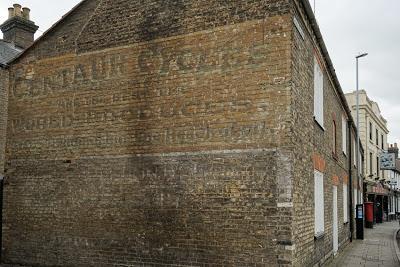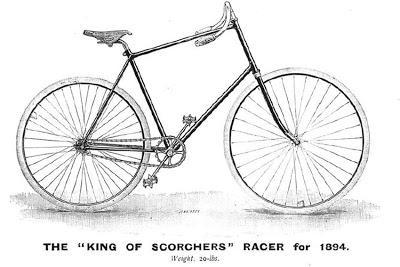
Centaur had indeed been founded in 1876, in Coventry. It was in 1890 that they developed their lightweight bicycle, the 'King of Scorchers' (sold as the 'Silver King' in the United States). Weighing only 26 lb - just under 12 kg - it would still be a fairly normal weight today.

A report from the 1908 Stanley Cycle Show, held in Islington's Royal Agricultural Hall, shows that the company continued to produce innovative, lightweight bikes:
Of course, the new "diagonal" frame is the attraction here. It is designed to give all the strength of the old Centaur frame while minimising vertical vibration. Other novelties are the Centaur spring-forks and spring seat-pillar, which agents should make a point of seeing, and recommending to customers who feel vibration. A remarkable machine is the new road racer at £6 10s., weighing, without guards, 27 lbs. On the best quality Centaurs it will be noticed that there are no clips for the pump pegs and brake fittings, these being brazed to the forks and main down tube. The light-weight roadster is a superbly-finished mount, scaling only 2E4 lbs., with guards complete.
The Centaur Company are showing a magnificent specimen of road racer. This has a 3.75in. tread, steel rims and detachable tyres, a front rim brake, fixed wheel, straight (duplex) chain stay, and comes out at 20.5bs., selling at £10 10s. retail. This machine should appeal to agents who have a speedy clientele, and it is supplied with either a horizontal or a sloping down top tube.
For 1909 every Centaur at £7 10s. and over will be fitted with Dunlop tyres. Mr. W. J. Welch, the firm's London manager, told us that he was expecting a very interesting machine from the works, but up to the time of our visit it had not arrived. This is an "all weather" bicycle, enamelled all over, except for a small plated disc on the extreme rear end of the back mudguard, the object of which is to reflect the light from the head-lamps of an overtaking motor car, and indicate the position of the cyclist. This extremely ingenious device is the idea of the rider to whose order this particular machine is built, and who is an active member of one of the hard-riding London clubs. The Centaur Co. do not seem to have lost ground during the three or four years they have been absent from the Show; their designs, finish, and prices are right up-to-date. and agents and public alike are pleased to see the famous old Coventry house again in evidence at the Agricultural Hall.When Edward Mushing, who had co-founded the business with George Gilbert, died in 1910 the company was taken over by Humber. Although they now produced the bicycles in Stoke-on-Trent, the name lasted a few more years until 1915. (There were also Centaur motorcycles from 1901 to 1914.)
This sign, then, is at least a century old.

